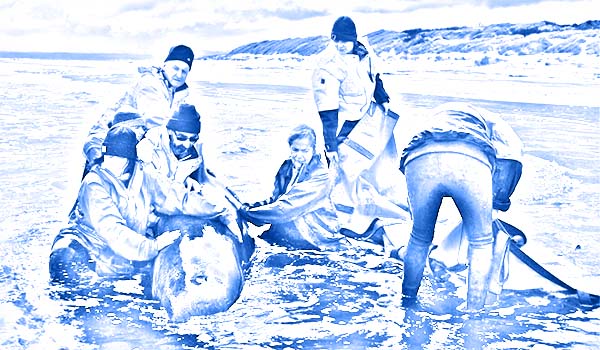Sri Lanka’s navy and volunteers rescued 120 pilot whales stranded in the country’s biggest mass beaching

Rescuers work to save a whale on a beach in Macquarie Harbour on September 25, 2020. Photo: AFP. Sketched by the Pan Pacific Agency.
COLOMBO, Nov 3, 2020, Sri Lanka Mirror. Sri Lanka’s navy and volunteers rescued 120 pilot whales stranded in the country’s biggest mass beaching, but at least two injured animals were found dead, officials said, Sri Lanka Mirror reported.
Navy sailors, the coastguard along with local volunteers had pushed back at least 120 whales by dawn Tuesday after a gruelling overnight rescue, AFP reports, quoting navy spokesman Indika de Silva.
“We used our small inshore patrol craft to pull the whales one by one back into deeper waters… Sadly, two whales have died of the injuries sustained when they beached,” de Silva has added.
Sri Lanka’s Marine Environment Protection Authority (MEPA) confirmed that Panadura saw the largest single pod of whales stranded in the South Asian country.
Scientific causes behind stranding or beaching remain unknown despite extensive research by experts for decades.
Don’t be quick to judge – Asha de VosThe stranded pod in Panadura are short finned Pilot whales.
Renowned Sri Lankan marine biologist and pioneer researcher – Dr. Asha de Vos was also at the site since last evening and had addressed claims on social media which cited that the animals were mishandled.
Noting that the animals weighing between 1000 – 3000 kg were fatigued and distressed and smashing their tails, she explained that this, in addition to the darkness of the night and the tossing waves, was a challenge for those engaged in the rescue effort.
“It was difficult for the men (who were also fatigued) to turn them upright against the crashing waves, to direct them into the surf and to move them beyond their own height of water. If you’ve never been in this situation, please don’t be quick to judge,” she noted on her social media accounts.
“These people cared less about their own safety in the crashing surf than the safety of these animals in a very difficult time in our planet’s history,” she added.
“Once I explained that the whales breathe from their blowholes that are located at the tops of their heads, and that they need to ensure the airways remained unblocked, they tried their level best to keep the animals upright – but it was hard. The waves kept tossing the animals and the people. “